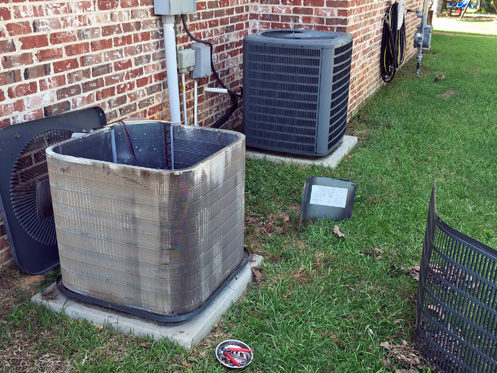That’s a tough question. It would be easier for most to describe the “perfect” car to drive. Some feel the “perfect” car is the one that gets them from Point A to Point B. Cheaper is typically better. At the other end of the chart are the drivers that want luxury regardless of the cost. Thrill-seekers may require a sleek and fast vehicle. Still, others are concerned only about safety and performance.
There is not a “perfect” car for all situations. We can make similar comments about heating, air conditioning, and ventilation (HVAC) systems. Approximately 10% of consumers only want a basic system that keeps them warm in the winter and cool in the summer. Cost is important. 10% of consumers tend to purchase the most expensive HVAC system to get the best system available for energy savings, comfort, and health reasons.
The other 80% fall somewhere in between. They want the best system they can get for what they have available to spend. That’s also the group that proportionally has the highest risk of making purchasing mistakes because they have additional variables to affect the outcome. There is more to evaluate, and it can be difficult to understand what to ask for. The unknown tends to cloud our decision process.
Henry Ford summed up that concept well by saying, “If I had asked people what they wanted they would have said faster horses”. Few knew then there would be great transportation options in our future.
We can probably say something similar about HVAC options. Few consumers fully understand their choices unless they purchase HVAC equipment regularly or move around a lot. Technology quickly changes and can be confusing. At the same time, it’s good to be accurate because the “perfect” HVAC system installed properly will quickly pay for itself in lower utilities and also protect our health.
Understanding options make it possible to get the “perfect” car and also the “perfect” HVAC system to meet our needs. Responsible HVAC companies will help make that decision process much easier if they truly listen and then give the consumer choices. Comfort Consultants at John Henry's Plumbing, Heating, Air, and Electrical offer good, better, and best options.
The 10% of consumers that want the cheapest system possible still need to understand there is a vast difference in HVAC equipment, so let’s clarify some basics. Some furnace manufacturers have cut corners to the print quality suffers. Metal is thin and fatigues easier. Operation is typically noisier and equipment life is shorter. It’s the cheapest of the cheap.
It’s still possible to fill that cost need from quality heating and air conditioning equipment manufacturers with what is called the builder’s model line. It’s made primarily to meet the low-cost need yet maintain quality.
The next 80% of consumers want the best system they can afford. This group of consumers needs to be cautious because the choices in equipment and HVAC contractors add to the difficulty in making the right decision. Choosing the right HVAC equipment is fairly easy by researching on Consumer Reports. If you stick with the top brands, odds are in your favor (Trane, Lennox, etc.).
An important step in getting the “perfect” heating and air conditioning system requires hiring a quality HVAC contractor that has integrity and the right attitude. Not all HVAC contractors are “created” equal so do your homework. Start by checking with the Better Business Bureau. What is their rating? Some HVAC contractors are not BBB members. Do you want them in your home?
The #1 trade taught in prisons is heating and air conditioning. Add to that the fact few HVAC contractors do drug and alcohol screening or background checks when hiring. If a new HVAC system takes a full day to install, will you be there the whole time? Who is that stranger in your home? Will they come back uninvited someday?
Another concern is the majority of HVAC technicians are self-taught. Many started working in HVAC construction and for whatever reason became technicians over time. Experience is valuable, but the best technicians tend to have technical school backgrounds and are North American Technician Excellence (NATE) certified. Working on HVAC equipment today is similar to working on cars in the 1960s vs. cars built today. Few can do it well without training.
The bottom line is it takes quality HVAC contractors with trustworthy employees that are well trained to install quality HVAC equipment to get the perfect heating and air conditioning system.

